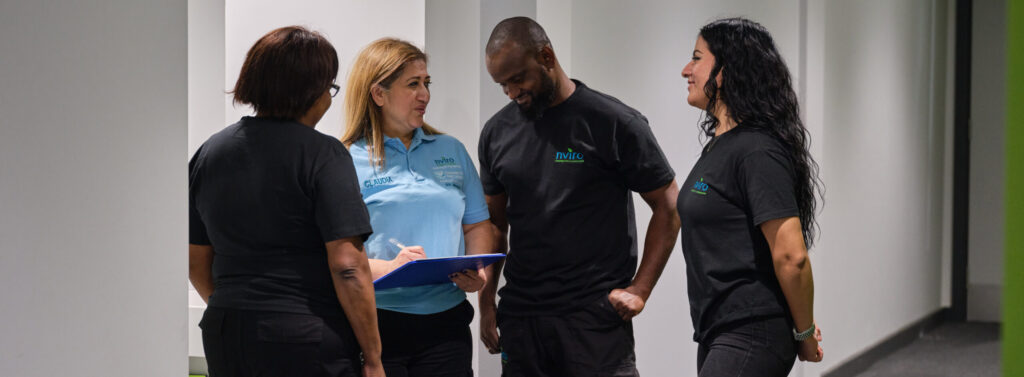How to get ready for a TUPE transfer
02 January 2024 Category: Local Authority & Housing Nviro News Schools, Academies and Trusts
Navigating the TUPE transfer process can seem like a daunting process and it can be a minefield. At Nviro, we are well acquainted with the routine of transferring colleagues between companies, making the process more manageable. So, we can assure you that we will support you every step of the way. Here are some key tips on things your HR team may need to know when contemplating the outsourcing of your cleaning services.
HR benefits of outsourcing
In deciding to outsource your cleaning services, the responsibility for all HR-related aspects concerning your cleaners will transition to their new employer who will then handle all tasks such as managing their holiday, sickness/absence, performance, conduct, training and pay. This move usually saves money but also has the potential to reduce your HR workload significantly.
When does TUPE apply?
This type of TUPE transfer is due to service provision changes, this means that the activities carried out by the in-house team, before the service change takes place, must be fundamentally the same as the activities carried out after the service change and only the colleagues who are clearly identified as providing the service are protected. The colleagues who carry out the majority of their work (more than 50%) on the cleaning services will be eligible for transfer.
The first steps
Before anything happens, we’ll ask for Employee Liability Information (ELI). This data relates to the affected colleagues and their contractual T&Cs. This helps us to ensure we comply with the colleague’s terms and conditions post-transfer and have all the appropriate information to be able to manage them effectively. The information we request is:
- The colleague’s name and relevant personal information.
- Key information about their employment – including implied terms to their contract.
- Disciplinary action taken against the colleague in the last two years.
- Grievances raised by the colleague in the last two years.
- Information relating to any collective agreements.
- Legal action taken by the colleague in the last two years and any potential legal action that may arise.
Legally, the information has to be provided to us 28 days prior to the transfer taking place, although the sooner we receive this information, the better, as it gives more time to effectively consult with the colleagues and ensure that all factors of their employment and job role are taken into consideration when providing the measures.
It’s a good idea to check the ELI with the colleagues and their immediate line manager before it is sent to the new employer, as this ensures that everyone is clear and in agreement on the data that is provided, as things often change in practice but are not always recorded formally.
Changing terms and conditions
In the event of a TUPE transfer, your colleagues are looked after. TUPE law prohibits the harmonising of the employment contracts terms and conditions for an indefinite period. Therefore, at the point of transfer, the colleague’s contracts will be protected and will not be changed without prior consultation and agreement.
The only reason changes will be made to terms and conditions is if the reason is an economic, technical, or organisational reason (ETO) involving changes in the workforce. This could cover reasons such as how the company is performing, the processes being used or the structure or management of the business or the new commercial contract. Where changes are made as a result of an ETO reason, appropriate consultation and fair practice will be followed.
Colleague representatives and Trade Unions
Where recognised Trade Unions are present, they need to be informed and consulted with regarding the transfer by the outgoing employer. Where Trade Unions are not present and there are more than 10 colleagues affected by the transfer, you should inform and consult with an elected colleague representative. Where there are less than colleagues, you can inform and consult directly with the colleagues themselves.
You can find more information on this here.
Informing and consultation before making any changes
Once you have identified who is eligible to transfer, you should inform your colleagues or trade union or representatives of the details of the transfer. The information provided should be in writing and should include the following:
- The fact that the transfer is happening, approximately when it is happening and why it is happening.
- The name of the new employer.
- Any economic, social, or legal implications for the affected colleagues.
- Any measures that the employer expects it will take in respect of the affected colleagues (and state none if no measures are expected to be taken.
In our experience, the new employer will make every effort to make the transition as smooth as possible, making contact with the transferring colleagues, in writing and where possible face to face. They will let you and the colleagues know of any changes that will made as a result of the transfer. A good employer will support you with these consultations too. The measures may include things like changes to the colleague’s pay date or the holiday year, to align them with the rest of our business. We will use the ELI that you provide us with to help put these measures together and identify any changes as a result of the transfer, so, the more information you can provide us with on the ELI, the better. It’s important to note that any changes made will be due to an ETO reason only.
Meeting the cleaning team
It’s important that the new employer meets the cleaning team prior to the transfer taking place. The cleaners need to know who they’re going to be working for and to see a collaborative approach between their old and new employer. Usually, the Nviro HR team will meet with the colleagues to support the consultations, as well as to collect the personal data that we require to employ them. In addition, we will meet with them to complete an induction and carry out training to ensure they are well-equipped to use our cleaning materials and equipment safely.
Post transfer
Post transfer Nviro will maintain contact with your HR team to resolve any employment queries and ensure a smooth transition for the colleagues. We encourage all queries from the colleagues to be directed to Nviro and to not direct their concerns to the site staff, including the HR department. This lets us get to know your team and helps us to understand their concerns so we can help them to feel part of the Nviro team.
As a specialist cleaning provider in educational and local authority settings, Nviro provides clean, hygienic and safe environments for building users to thrive in. Read our blog about ‘Nviro and the Mobilisation Process‘.


